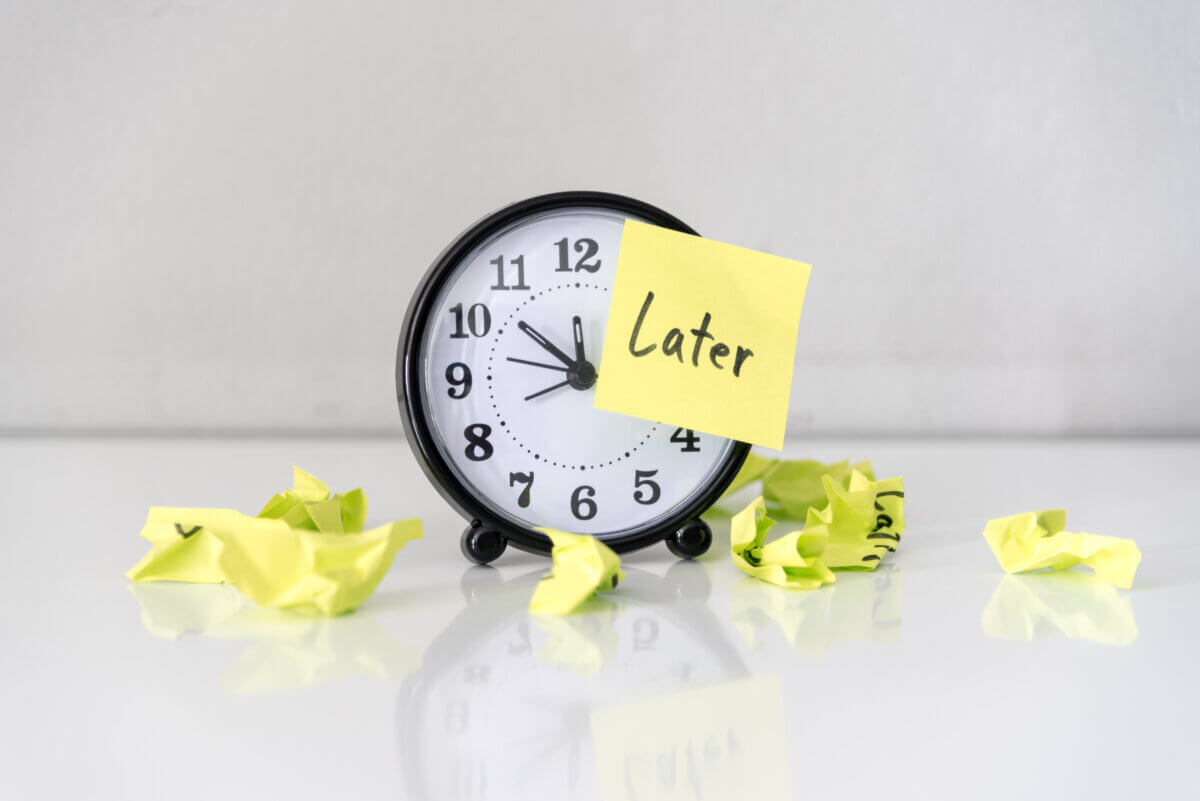
(Credit: ntkris/Shutterstock)
TÜBINGEN, Germany — Chronic procrastinators are often seen as lazy, but a new study suggests that it's more than just a lack of motivation. A new study published in the Proceedings of the Annual Meeting of the Cognitive Science Society examined the cost-benefit risks the brain goes through when deciding to put off tasks, especially in the face of serious consequences or failure. According to researchers in Germany, understanding why people wait until the last minute to finish important tasks would help create more effective strategies when it comes to productivity.
Procrastination is a complex issue, especially when you consider that most people have been guilty of doing this at least once. Whether it’s filing taxes, meeting a project deadline for work, or simply cleaning out the garage, procrastination causes people to delay tasks despite having the time to do them right away. Given the stress, anxiety, and guilt that can come with procrastination, it’s surprising the human brain continues to support this bad habit.
One issue with procrastination is more than waiting until the last minute to complete a task. While they might look alike, there are different forms of procrastination.
“Procrastination is an umbrella term for different behaviors,” explains Sahiti Chebolu, a computational neuroscientist from the Max Planck Institute for Biological Cybernetics, in a media release. “If we want to understand it, we need to differentiate between its various types.”
A common pattern of procrastination, for example, is not following through on a decision. You might have set aside time to do laundry in the evening, but when the time comes, you decide to watch a movie instead. Usually, something is stopping a person from committing to the original task and waiting for the right conditions or motivation to start the work.
In the current study, Chebolu categorized each type of procrastination and narrowed it down to two explanations: misjudging the time needed to complete the task and protecting the ego from prospective failure.

The Theory Behind a Distracted Brain
The theory of procrastination is that it is a series of temporal decisions or making a choice now that would have consequences later. For example, deciding to file taxes on Friday but then choosing to watch a new show on TV when the time comes. Obviously, missing the Tax Day deadline results in penalties and other financial consequences — yet people do it anyway.
According to the authors, the brain weighs all the rewards and penalties of choosing an alternative behavior. However, the brain is biased and prefers immediate gratification over delayed pleasure. The joy of watching television right now is a more appealing option to the brain than the relief of filing taxes three weeks later. It’s too long of a wait for the reward, so the brain prefers the quicker option.
Now, if this were the case all the time, no one would get anything done. That’s why the brain also considers the penalties for making a different decision. However, the study finds the negative outcomes have less weight than the option that gives immediate pleasure. The brain will always try to find the easiest and most immediately pleasurable option.
Evolutionarily, this makes sense. The distant future is always full of uncertainties, so the emphasis should be on helping yourself in the present moment. Procrastination comes when this mental process becomes maladaptive. Chebolu says people’s decision-making skills become flawed as they put too much emphasis on experiences in the present and not enough on the future.
Methodology
The research team looked at large datasets to study real-life procrastination. The data included a log of students who needed to complete a certain number of hours taking part in experiments over the course of a school semester.
Some students completed the task right away. Other students spaced out the requirement by enrolling in experiments over several weeks. Others waited until the very last minute to complete all their experiment requirements. Chebolu then ran simulations to reproduce the students’ behavior and understand why people procrastinated on a task that would affect their course grades.
Key Results
The theory behind procrastination is that the brain always chooses the option that will give the most immediate pleasure. However, the current study showed this is only one factor in the decision to procrastinate. Another issue is uncertainty.
This could look like failing to predict how much time is needed to complete a task, such as the time needed to dig up receipts and W-2s to file taxes and calculate deductions. Uncertainty also looks like a lack of confidence in a person’s ability or doubting whether a task will help them achieve their goals.
Discussion and Takeaways
According to Chebolu, understanding how procrastination works and why someone would want to delay a task can help tailor strategies to prevent it.
If procrastination is caused by a bias towards instant gratification, the best solution is to set up short-term rewards. The Pomodoro method, for example, gives people breaks for working a set period of time. People who underestimate the time needed to complete a task could try time-bound goals, such as setting a personal deadline.
If you abandon the task once you start, the authors recommend avoiding distracting environments. The most important thing, however, is not to beat yourself up if you fall into the trap of procrastination. Everyone does it. Forgiving yourself is also one of the most important steps towards better productivity.










